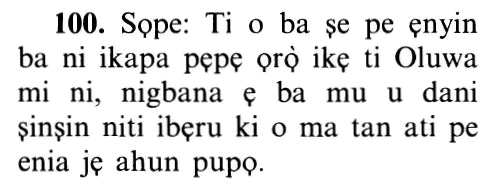17vs100
Select any filter and click on Go! to see results
قُل لَّوْ أَنتُمْ تَمْلِكُونَ خَزَآئِنَ رَحْمَةِ رَبِّي إِذاً لَّأَمْسَكْتُمْ خَشْيَةَ الإِنفَاقِ وَكَانَ الإنسَانُ قَتُوراً
Qul law antum tamlikoona khazaina rahmati rabbee ithan laamsaktum khashyata alinfaqi wakana alinsanu qatooran
Index Terms
Click to play
Yoruba Translation

Hausa Translation
Ka ce: "Dã dai kũ, kunã mallakar(2) taskõkin rahamar Ubangijĩna, a lõkacin, haƙĩƙa dã kun kãme dõmin tsõron ƙãrħwar taskõkin. Kuma mutum yã kasance mai ƙwauro ne."
Asbabu n-Nuzuul (Occasions of Revelation)
Holding back is Part of Man's Nature
Allah says to His Messenger:
قُل لَّوْ أَنتُمْ تَمْلِكُونَ خَزَآئِنَ رَحْمَةِ رَبِّي إِذًا لَّأَمْسَكْتُمْ خَشْيَةَ الإِنفَاقِ ...
Say: "If you possessed the treasure of the mercy of my Lord, then you would surely hold back for fear of spending,
"Tell them, O Muhammad, even if you had authority over the treasures of Allah, you would refrain from spending for fear of exhausting it.''
Ibn Abbas and Qatadah said,
"This means for fear of poverty,''
lest it run out, despite the fact that it can never be exhausted or come to an end. This is because it is part of your nature.
So Allah says:
... وَكَانَ الإنسَانُ قَتُورًا ﴿١٠٠﴾
and man is ever miserly.
Ibn Abbas and Qatadah said:
"(This means) stingy and holding back.''
Allah says:
أَمْ لَهُمْ نَصِيبٌ مِّنَ الْمُلْكِ فَإِذاً لاَّ يُؤْتُونَ النَّاسَ نَقِيراً
Or have they a share in the dominion Then in that case they would not give mankind even a Naqira. (4:53),
meaning that even if they had a share in the authority of Allah, they would not have given anything to anyone, not even the amount of a Naqira (speck on the back of a date stone).
Allah describes man as he really is, except for those whom Allah helps and guides. Miserliness, discontent and impatience are human characteristics, as Allah says:
إِنَّ الإِنسَـنَ خُلِقَ هَلُوعاً
إِذَا مَسَّهُ الشَّرُّ جَزُوعاً
وَإِذَا مَسَّهُ الْخَيْرُ مَنُوعاً
إِلاَّ الْمُصَلِّينَ
Verily, man was created very impatient; irritable when evil touches him; and stingy when good touches him. Except those who are devoted to Salah (prayers). (70:19-22)
And there are many other such references in the Qur'an. This is an indication of the generosity and kindness of Allah.
In the Two Sahihs it says:
يَدُ اللهِ مَلْأَى لَا يَغِيضُهَا نَفَقَةٌ سَحَّاءُ اللَّيْلَ وَالنَّهَارَ، أَرَأَيْتُمْ مَا أَنْفَقَ مُنْذُ خَلَقَ السَّمَوَاتِ وَالْأَرْضَ، فَإِنَّهُ لَمْ يَغِضْ مَا فِي يَمِينِه
Allah's Hand is full and never decreases because of His giving night and day. Do you not see how much He has given since He created the heavens and the earth, yet that which is in His right hand never decreases.
يقول تعالى لرسوله صلوات الله وسلامه عليه قل لهم يا محمد لو أنكم أيها الناس تملكون التصرف في خزائن الله لأمسكتم خشية الإنفاق قال ابن عباس وقتادة : أي الفقر أي خشية أن تذهبوها مع أنها لا تفرغ ولا تنفد أبدا لأن هذا من طباعكم وسجاياكم ولهذا قال " وكان الإنسان قتورا " قال ابن عباس وقتادة أي بخيلا منوعا وقال الله تعالى " أم لهم نصيب من الملك فإذا لا يؤتون الناس نقيرا " أي لو أن لهم نصيبا في ملك الله لما أعطوا أحدا شيئا ولا مقدار نقير والله تعالى يصف الإنسان من حيث هو إلا من وفقه الله وهداه فإن البخل والجزع والهلع صفة له كما قال تعالى " إن الإنسان خلق هلوعا إذا مسه الشر جزوعا وإذا مسه الخير منوعا إلا المصلين " ولهذا نظائر كثيرة في القرآن العزيز ويدل هذا على كرمه وجوده وإحسانه وقد جاء في الصحيحين " يد الله ملأى لا يغيضها نفقة سحاء الليل والنهار أرأيتم ما أنفق منذ خلق السماوات والأرض فإنه لم يغض ما في يمينه " .
"قل" لهم "لو أنتم تملكون خزائن رحمة ربي" من الرزق والمطر "إذا لأمسكتم" لبخلتم "خشية الإنفاق" خوف نفادها بالإنفاق فتقتروا "قتورا" بخيلا
أي خزائن الأرزاق . وقيل : خزائن النعم , وهذا أعم .
I'raab - grammatical analysis of the Qur'an
«قُلْ» أمر فاعله مستتر والجملة مستأنفة.
«لَوْ» حرف شرط غير جازم.
«أَنْتُمْ» توكيد للفاعل المحذوف مع فعله لأن لو تدخل على الفعل والجملة ، والجملة المحذوفة ابتدائية لا محل لها.
«تَمْلِكُونَ» مضارع مرفوع بثبوت النون والواو فاعل والجملة تفسيرية.
«خَزائِنَ» مفعول به.
«رَحْمَةِ» مضاف إليه.
«رَبِّي» مضاف إليه والياء مضاف إليه.
«إِذاً» حرف جواب.
«لَأَمْسَكْتُمْ» اللام واقعة في جواب لو وماض وفاعله والجملة لا محل لها لأنها جواب لو.
«خَشْيَةَ» مفعول لأجله.
«الْإِنْفاقِ» مضاف إليه.
«وَكانَ الْإِنْسانُ قَتُوراً» كان واسمها وخبرها والجملة مستأنفة.
